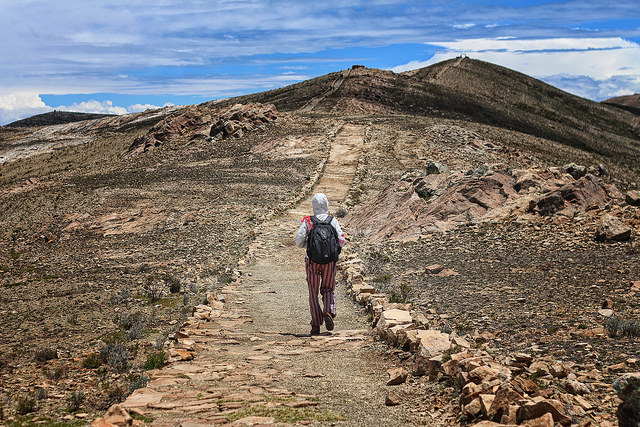
Anyone can pack an old brown suitcase, cover it in gas station bumper stickers, and hit the road. Not everyone can leave the old version of themselves behind.
When it comes to leaving, bigger changes must sometimes be considered—more than a changed address: a new phone number or no phone at all, a closed bank account or just cash in a Maxwell House tin can, cutting of all of that hair or letting it grow like wildflowers, crushing old lovers or letting new ones in, ripping off the rearview mirror in favor of a forward-facing windshield view.
The hardest part of leaving may include severing people and places and memories in a way that is as permanent as severing a limb or decapitating a head. These may be things that no longer serve us, or the souls we have begun to evolve into—-they have no intention of holding us back, but we cannot compel departures from the past from anyone but ourselves. Yes, the crushing sting of separation may burn our ribs, but if we lean into it, we will be gradually soothed by the salve of great possibility.
We may find that the hardest person to leave behind is the person who we used to be.
Unless the past is left behind in the right ways, we may always feel confined in any new place we go to. We will always sense the imminent danger of that dangling electrical wire of the past in our path, wrought with the high voltage eventuality of a return to the world and version of us that was most urgently departed. That person that will always be waiting on the doorstep; limp, ghostly, but also completely ready to snap up and invade our mind’s space again.
We may even be away from our old selves for some time, convincing ourselves that that person we once were is long gone. It might be easy forget things that happened when we busy ourselves hourly, daily, weekly. Old parameters of the self becoming history, former familiarities becoming strange. But are we healing and changing, or are we just distracted? Are we just inventors now, elaborate costume-makers of false identity, crafting beautiful and deceiving veils that hide our eyes—not only from others, but from mirrors we pass?
Our eyes stay the same no matter what state lines we’ve crossed.
And to ignore that pasts exist at all, outside of the spotty dreams or clouded memories that reincarnate them, is a kind of self-deception, because they’re there, they’re inside of us. They are alive every day, walking around, forgetting too, until one day there we stand. Face to face with memories that we fear more than any actual bed monster.
We will find ways, maladaptive or brave or both, to weather the shock of seeing this again, but even still, it will leave our insides in flames, our intestines in tangled-necklace knots, our hearts in glass pieces all over the windowsills of childhood bedrooms and hallways of our high schools.
In the darkest days of facing down what was, we may have torturous nightmares. Sometimes those vague visions turn into blinding neon colors and morph into people that we can hear speaking and laughing. We might be able to smell or touch them. This is frightening, but there is reason for it all. We have not left them behind—we have only buried them.
We may have panicked dreams of drowning, of floods blasting through doorways, watching pets or babies we must rescue in a churning river, frantically flapping our arms to surface, and then, we always do, in a sharp awakened gasp, clutching our hearts and wondering if it will ever pass. These water dreams represent our deepest emotions—we must heed them. We cannot hide beneath the tiny straw hut we lazily built—there is no protection there, since we forgot to layer bricks and mortar.
When we don’t build the foundation, we’re more vulnerable to the storm.
We rushed because we were taught, as little ones, to ignore what feels bad, to push away what feels uncomfortable. So we end up with a life, and a self, that not only rattles when a hint of trouble passes through, but one that can be swept away at any moment like a feather. Something we thought was strong and real, lost in one dandelion breath.
Desensitization is the opposite of healing, but strangely, it can sometimes feel the same for a spell.
But all parts of nature, which we are a part of—the water, the sea, rainstorms that come and go with such intensity—can remind us of our power to recover, to flow, to shiver and ripple in the shifting winds. We aren’t empty shells waiting for the tides to yank us away, we are oceans ourselves. We are strong and resilient, vast and churning, we don’t have to paint a gloss over our history to leave it behind.
Perhaps we can only destroy the demons that follow us around when we let them all in—when we can sit down with them for tea, scream, cry, lash out, forgive, we slowly heal.
Old partners, betraying friends, raging mothers, distant fathers, anyone we trusted, anyone that gutted us—we can embrace hatred, guilt, loss, despair, humanness.
When we are free to accept the old hurt we once fled, we will know that we are ready to go.
So in this, proper leaving is not a mad dash away—it is more like a slow shedding of a skin.
And then, it is an arrival.
Author: Meg April
Image: Pedro Travassos at Flickr
Editor: Renée Picard






Read 0 comments and reply